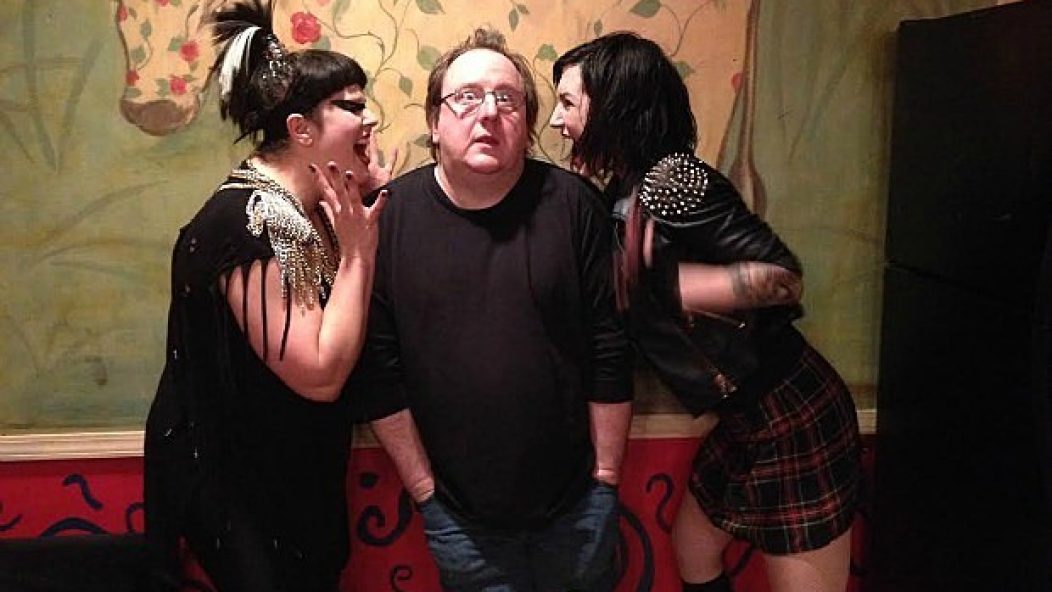
30 Years Of AP: From grunge to emo, with editor in chief Jason Pettigrew
In celebration of Alternative Press’ 30th anniversary, we’ve conducted special interviews with the magazine’s “founding fathers,” so to speak. Jason Pettigrew is AP’s editor in chief, and he’s been with the company since 1986—almost its entire 30 years! Pettigrew is a unique blend of rebel and class—he could fit in at the roughest of basement shows, or sipping tea with the queen of England. Graveyard adventures with Trent Reznor, beefs with other magazines and the first coming of Nirvana are just some of the inflection points that dot his lengthy career. In short, the guy has some stories to tell.
Photo: Jason Pettigrew with Kitty and Lyn-Z of Mindless Self Indulgence, 2013
What was your first experience with AP? Do you remember your first time seeing the magazine?
[AP founder] Mike Shea wrote a review of Bauhaus singer Peter Murphy’s solo record—it was a 12-inch of him covering Pere Ubu’s “Final Solution,” and he took umbrage with the fact, “Why is the guy that’s all darkness covering a Pere Ubu song? This is stupid; it should be dark.” I was like, “Dude, this rocks hard. What are you talking about?” He had his address and phone number in the masthead, and of course I called him. I said, “What the hell were you thinking when you wrote that Peter Murphy review?” He kind of got a little defensive with me and said, “Well, you think you can do better?” And that’s how I got involved with Alternative Press. Message to everyone: That is not how you get a job in the year 2015.
When did you become an editor?
I became senior editor in 1992. Mike said he couldn’t bring me to Cleveland at the time [Pettigrew was living in Pittsburgh], because they were still running the magazine’s office out of a two-bedroom apartment in a dodgy part of the west side. There wasn’t enough space for another person until he moved to another place. I hated my record store job and manager so much, I counted down to the busiest shopping weekend of the Christmas season counted back two weeks. I put in my two weeks notice exactly where I would be leaving him on the biggest shopping weekend possible.
What was the magazine like when you arrived?
When I finally arrived in Cleveland, everyone had their own thing they were doing. Everyone was hustling, whether they were hustling for advertising or hustling for an exclusive story. We were hustling, but we were still very much music fans. In the office, someone would be listening to full-on electronic music—you know, the British acid-house movement, techno, all that stuff was really happening back then. Somebody was into all the British imports. Someone was into cock-rock/mainstream rock. So you had a bunch of different personalities who had different tastes. [We were] very much idealistic music fans who were doing something they could get behind; it didn’t matter that we weren’t making $70,000 a year. It didn’t matter that some of us had to get second jobs to pay bills, because we were all really into and believed in what we were doing. It was genuinely honest.
We were fans first and business people second. The problem is, you can put a cool band on the cover, and, maybe, 7,000 people will buy it—simply because, “Oh, this is interesting. I’ve kind of heard of this band, and it’s really interesting that there’s a magazine that would actually put them on the cover. Maybe I’ll like the rest of it” I mean, there was no internet back then, so how did you discover new bands? Well, there was college radio and fanzines and stuff like that, but there really wasn’t anything taking up the void we saw. This is kind of why I immediately gravitated toward Alternative Press, because I like a lot of different stuff—and so does Mike. Back then, he was booking hardcore shows, but he was also way into dance music like Book Of Love and British stuff like the Smiths and the Cure.
What was owner Mike Shea like back then?
The same guy that he is now. He had the same type of enthusiasm for stuff, but he had to grow into that thing where in order for him to run a business, he really couldn’t be in record stores for hours, listening and discovering new things. He couldn’t get entrenched in it the way the editors were. Because there were editors, Mike couldn’t do that anymore, because Mike had to worry about keeping the doors open and paying the print bill and all of the stuff that requires a complete focus. At that point in time, he was coming to terms with the fact that he really couldn’t donate his personal time to it the way we could. He had the responsibility of a business to run. You need a leader. If you have a bunch of jamokes who are listening to records and writing about them, that’s fine, but you really need to know where the money is to pay the print bill.
When you’re in the moment, you don’t realize history is happening right now. Were there any significant historical events in music you went though back then and didn’t realize at the time?
The whole Nine Inch Nails zeitgeist, and the industrial rock thing. That scene had been happening for a long time, obviously—Ministry and Al Jourgensen. But when Nine Inch Nails were able get all sorts of above ground reviews, it was like, “Whoa! What’s happening here?” The fact that Trent Reznor was able to take the grating, electronic noise and dance elements and be able to put a human veneer on it—that was a really interesting, important thing. I’m glad I got to witness that and see a bunch of those shows.
Did you have any crazy run-ins with Trent Reznor?
There was the legendary Revolting Cocks tour, which was Al Jourgensen’s other band. I was doing a tour story for Alternative Press. Trent was fighting with his record label, because he was touring behind Pretty Hate Machine for years. He was never allowed to make a sequel because of the contractual obligations. So he went on that tour and joined us, and there are ridiculous stories, because that thing was complete debauchery. Let’s just say there was a story regarding him and I and a box of whip-its in a cemetery in New Orleans. [Laughs.]
How was the magazine treated in the music industry back then?
People liked what we were doing, and they were very supportive. There was a new culture that was rising up that wasn’t the crap that was on MTV and radio. It turned into a community, and then it turned into a wide culture. There was a lot of support. There was a lot of back-biting, too, because a bunch of other magazines were starting up around the same time. They were doing the same things that we were. SPIN just started to happen, which had deeper pockets than Alternative Press, obviously.
What did you think of your competitors?
Some of them were good, and some of them had us like, “Really? Okay, whatever, dude.” I’m sure they thought the same thing about us. There was one magazine, Reflex, that did what we did. They actually had my favorite band in life on their cover, the Screaming Blue Messiahs. I was like, “Oh my god. Why can’t Alternative Press have the Screaming Blue Messiahs on the cover?” Well, Jason, you idiot, the problem is you have to sell this thing, and you can’t be that specialized. You can’t say, “It’s only us, and we’re gonna be the tastemakers,” because it wasn’t only us. There was Reflex, B-Side, some things that were owned by media companies, like, Tower Pulse and Request. They were doing the same things that we were, but we were very ideologically pure, like a fanzine would be. Radio would talk about “the new alternative rock” and they’re not talking about Nine Inch Nails or Fugazi or even Nirvana back then; they were playing Frente! and 311—dumb mainstream music for people who wanna have a keg party with their buddies.
Did you have any nemeses back then?
Everyone at those other magazines were fond of talking smack on us. When AP would get opportunities that B-Side [fanzine in the Philadelphia area] didn’t, the editors from that magazine were always ready to call foul on something, no matter what it was. I was on a panel about “running your own magazine,” and they were there screaming at the panel, “You shouldn’t be there because you don’t own AP.” They would ramp up their AP hate, and because I’m kind of the guard dog, I would immediately throw it back in bigger ways. But I became friends with Carol Schutzbank, who was their public face, and we were like, “Why are we even doing this?” She was a really nice person; she was really passionate about music. She had to have a heart transplant, and she was okay for a couple months, but she passed on. That’s a nemesis-turned-friend, and I really wish she was still around, because I’d just like to call her up and say, “Hey, how you doing? What are you listening to?”
There were some writers who thought they were above what Alternative Press did. At one magazine panel, Craig Marks from SPIN referred to Alternative Press as a “catalogue of crap.” I was on the panel and said, “People with demo tapes shouldn’t send them to SPIN unless they’re signing to Matador Records.” He had buddies at Matador Records, part of the New York cool cabal. Craig said, “What did you say?” and the room went, “oooooh.” I repeated the whole thing again.
Did you feel like what you were doing was important?
It was important that this culture be documented. There were bands who were struggling and doing great things that people needed to know about. I genuinely felt that. The thing is, we were naive to think that everybody shared the enthusiasm. When Nirvana happened, suddenly, everyone was like, “Let’s go down to that bad neighborhood where bands like Nirvana used to play, because that’s what’s cool.” Nine months later, they build a Starbucks right up against that cool rock club. With the whole explosion of alternative rock, we thought it would break open a sense of wonderment and a sense of community. Like, you don’t have to listen to everything that radio and MTV throw down your throat! There’s a whole underground culture of all sorts of great stuff. We thought people would be interested in this stuff, because it was where bands like Nirvana came from. No. That didn’t happen. Nobody really cared. It turned into a trend and a fad and nothing that had any type of real conscience behind it.
What was it like watching the magazine go through the ’90s, from where you started to where it ended up in the early-2000s?
The ’90s were exciting because there was all this stuff happening in various genres. In the mid-to-late ’90s, it was a lot of “what [band on the cover] is gonna sell this magazine? Because we need to grow the company.” We were music fans, but, businessmen? We were still working on that half. We were offered the exclusive first cover for Nirvana’s In Utero album. We were given the first cover. Half of the staff said yeah, go for it. And half of us were like, “No way! That’s like doing something corporate! Are you kidding?” There was actually a mentality that we shouldn’t do it, because Nirvana blew up, “were corporate” and “that’s not us, we’re Alternative Press.” Even in our first Nirvana interview, Krist Novoselic said, “I just wish they’d play somebody else. Instead of playing us eight times, play us five times a day, and give three new bands three playing slots.” Mike was like, “Are you people crazy?” Some were like, “No! We’re not crazy. This is about integrity.” I had no problem with Nirvana being on the cover, because I’m just glad they broke through. To this day, I’m eternally grateful to Nirvana for killing hair metal. I’m totally down with that. In the end, Mike was like, “It’s gonna be Nirvana, people.” And it’s good that he did that.
Wow.
Back in those days, Alternative Press was like a dog that had been beaten too many times, because we were tying to live up to everyone’s expectations. Everybody had expectations. You’re too indie. You’re too weird. You’re too corporate. You’re too major label.
And then in the 2000s, emo came.
There were all these bands on Warped Tour that weren’t being represented that much in AP. So our marketing person Aaron Wilson at the time was like, “Hey, there’s a whole community here we’re not addressing, and it’s a very passionate, engaged music culture.” Right around that time period, the nu metal guys were just insufferable and their demands were out of control. We were going to do a Korn cover for their Untouchables album. They weren’t giving out any advanced music—“No. You have to commit to a cover without hearing any music.” Right about the time when that community was getting all “we’re rock stars now” emo was happening and so was Dashboard Confessional. We thought, “We could play the Korn game or we could do Dashboard Confessional. Let’s do Dashboard Confessional.” Mike Shea was feeling kind of down and out; we were all kind of burned out, because we had to do things to keep the magazine going at that point—Creed on the cover, Sugar Ray on the cover. Mike has said before he was ready to shut it down. Then 9/11 happened, and that was a sobering moment.
We went with Dashboard on the cover and reviewed a leak of the Korn album, and it blew up. That AFI/Saves The Day cover did ridiculously well. We thought it was a fluke, so we put some nu metal bands on the cover after, and the response was “Nope!” Taking Back Sunday and the Used came along. At that point, we felt confident we didn’t have to deal with “rock stars” again, and we were all genuinely excited. We were essentially given a reboot in our enthusiasm and in our business because of this community. alt








